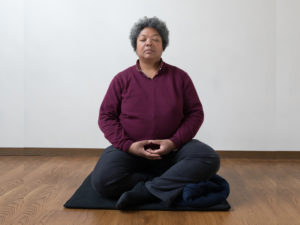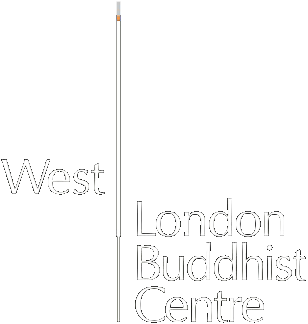Dreaming the Sangha
I’ve been looking back over my life recently, reflecting on my spiritual journey so far and how much I have changed over the years. Some of this reflection was triggered by being interviewed a couple of weeks ago as part of our sangha night mini-series, Desert Island Dharma. The idea for these sessions came out of a playful conversation with my friend Sophie as a fun format to encourage people to share their personal experience of practising the Dharma. So far Ratnadeva, Vilasamani and I have taken part (Amlanadhi will be our guest next Tuesday, the last in the present series). I’ve really enjoyed the opportunity of finding out about how others first began their spiritual journeys, how and where they first came into contact with the Dharma and what are the teachings and practices they have found inspiring and of practical help. It’s felt very real, very down to earth and easy to relate to their very different spiritual paths.

Sometimes studying the teachings can be a bit dry and we can feel there is a big gap between where we are and where we want to be, between who we are and who we want to be. I’ve always been inspired by these lines in the 3 Fold puja (a ritual written by Sangharakshita,the founder of the Triratna Buddhist Community). ‘The Buddha was born as we are born. What the Buddha overcame, we too can overcome. What the Buddha attained, we too can attain.” However, I’m painfully aware that I’m nowhere near Enlightenment and in the past have often been discouraged by the vast distance between my own spiritual development and the Buddha’s Awakening.
I remember years ago hearing a talk by Sangharakshita where he suggested that if we happened to meet a Buddha we might not even realise his true nature, might not make much of the encounter. He suggested that we are likely to benefit much more from contact with those who are just a little more spiritually developed than we are. I like to think that perhaps I would recognise any Buddha I encountered but I can’t be sure. What I do know is that I have benefitted greatly and continue to benefit from being around others with a spiritual practice that I can respect and learn from. Especially in seeing how they deal with the messiness of being human, applying the teachings and practices of the Dharma to the difficulties and challenges of everyday life.
In the same way, friendship has become really important to me, especially being part of a spiritual sangha. And I’ve come to see that creating sangha is a practice just as much as meditation, ethics or cultivating insight. Every time we meditate together, study together or connect in a genuine way with one another in the context of shared spiritual values we are practising sangha. Coming regularly to a weekly class gave me my first experience of sangha and now, thirty years on, I still experience sangha at the weekly classes I attend.
Going on retreat can give us a really strong experience of sangha as we form a temporary community, meditating, studying, carrying out simple jobs (like chopping vegetables for retreat meals), going for walks and sharing cups of tea. Something about our shared experience on and off the cushion not only creates conditions to deepen our meditation practice but also our ethical practice. Through bringing more kindness, generosity, honesty, awareness and sensitivity to our interactions, we create positive conditions for meaningful communication and connection with each other. We create sangha.
Since I became Chair of the West London Buddhist Centre a key part of my vision for the centre has been sangha building. It has given me great pleasure to see our community grow in size, in diversity and in spiritual commitment and to see a network of friendships developing. The sangha has grown so much in the years since we moved from our old premises in Westbourne Park Villas.
Yet, although this feels a positive change, sometimes I miss the intimacy of the old days. We had just one, small shrine room, a small reception room with one tatty old sofa and a minimal programme. Almost everyone attending the centre either came to Tuesday Sangha Night or the Saturday morning meditation class so there was a sense of a small, unified sangha where most people knew each other.
Yet, although this feels a positive change, sometimes I miss the intimacy of the old days. We had just one, small shrine room, a small reception room with one tatty old sofa and a minimal programme. Almost everyone attending the centre either came to Tuesday Sangha Night or the Saturday morning meditation class so there was a sense of a small, unified sangha where most people knew each other.
Nowadays, with so many classes, courses and events, sometimes it can seem as if the sangha is more scattered and people only know the people who come to the same events as they do. I’ve noticed on recent retreats that while I may have known people for years some may have never met. (It is lovely to see how these new connections often develop into lasting friendships). I realise that due to our individual life commitments and the fact that the centre is much bigger with a very full programme it is impossible for everyone in the sangha to know each other. But for me we are all one sangha and anytime we come together it gives me joy, whether it’s for a concert, film night, or to explore the Buddha’s teachings.
One of my dreams is that one time we come together in greater numbers is on festival days. These are celebrated by Buddhists from many traditions and so a way of connecting with the Buddhist sangha across the world (and also through time). So I would like to invite you to come to our next festival, Buddha Day on Sunday 19 May for a day of meditation, reflection, chanting and ritual with a shared vegetarian picnic lunch. Buddha Day, also known as Wesak, is the day when we celebrate the Buddha’s Enlightenment so there will also be readings and stories about his journey to Awakening. In the afternoon I will be giving a talk and launching the Year of Ratnasambhava at the wlbc.
Back when I had just started attending classes at the London Buddhist Centre, Ratnaghosha, their new chair decided to dedicate each year to a particular Buddhist teaching, choosing the theme of the 6 Perfections. I found this very inspiring and that is one reason why I decided last year to dedicate the next 5 years to the 5 archetypal Buddhas – Akshobya, Ratnasambhava, Amitabha, Amoghasiddhi and Vairocana. We are coming to the end of the Year of Akshobya and I am looking forward to a year dedicated to Ratnasambhava. Each of these Buddha’s highlight particular spiritual qualities and a particular approach to practice, engaging our imaginations and hearts through myth, archetype and symbol. On Buddha Day I will be introducing Ratnasambhava and explaining why I think he embodies qualities I think particularly connect with the West London Buddhist Centre’s vision and activities. Then over the next few weeks we will have a series of sangha night talks exploring different aspects of Ratnasambhava and how he can support our practice and our lives.
It would be lovely to see you on Buddha Day, and after all, without the Buddha there would be no West London Buddhist Centre, no sangha. And if you can’t make it do come along to sangha night or on one of our next retreats. Yashobodhi and Ratnadeva will be leading a weekend retreat 24-26 May and Sudurjaya, Ratnadeva and I will be leading a midweek retreat from 24-28 June You can find out about all the retreats we are running this year on our website. And if you want to come on retreat but have limited funds do get in touch as we do offer some bursary places.
with metta,
Bodhilila

